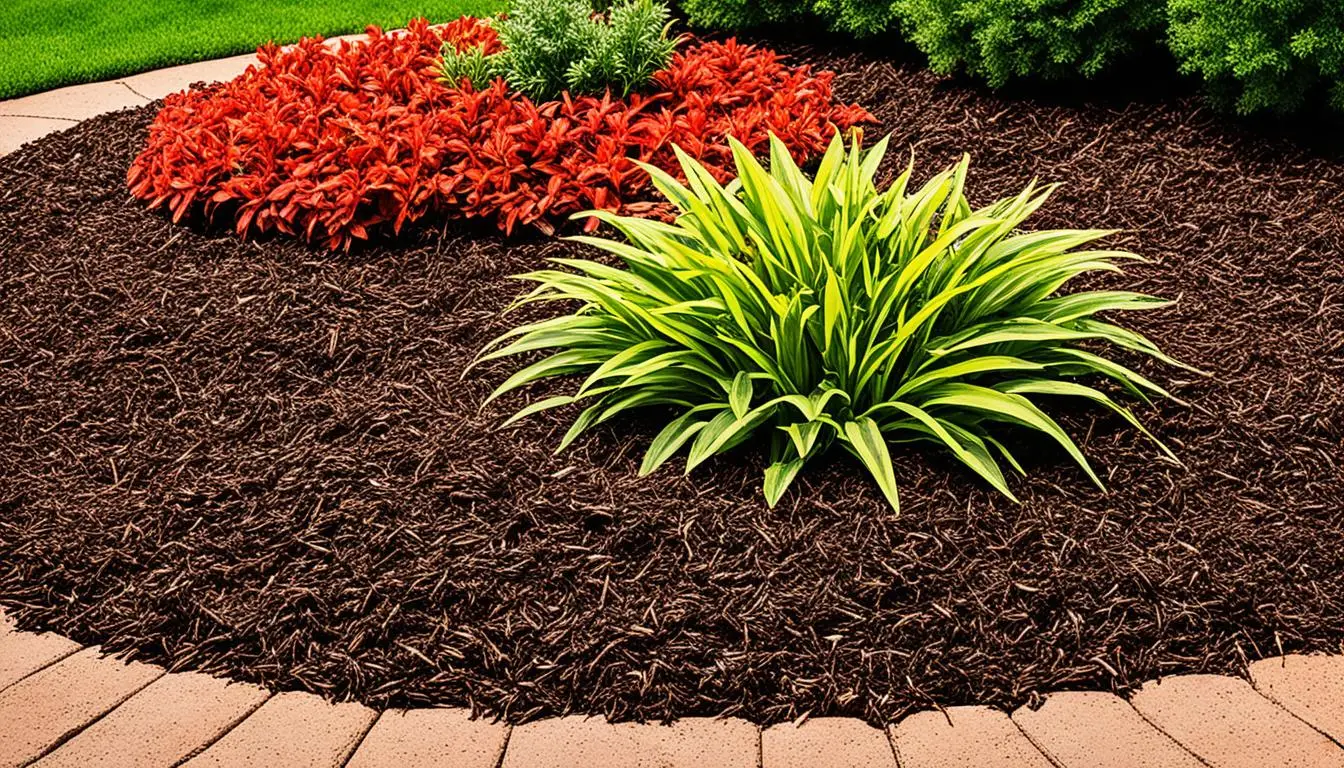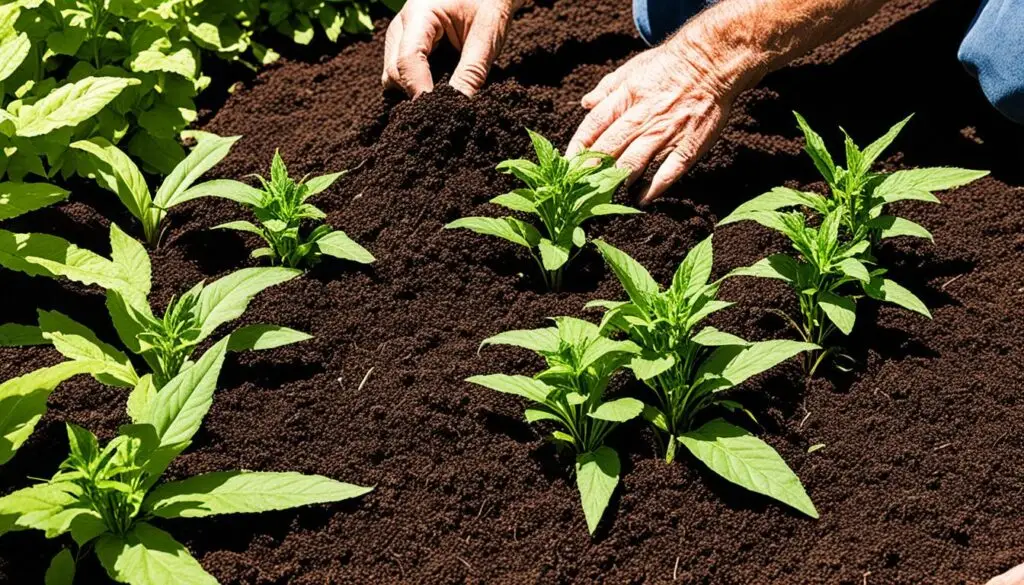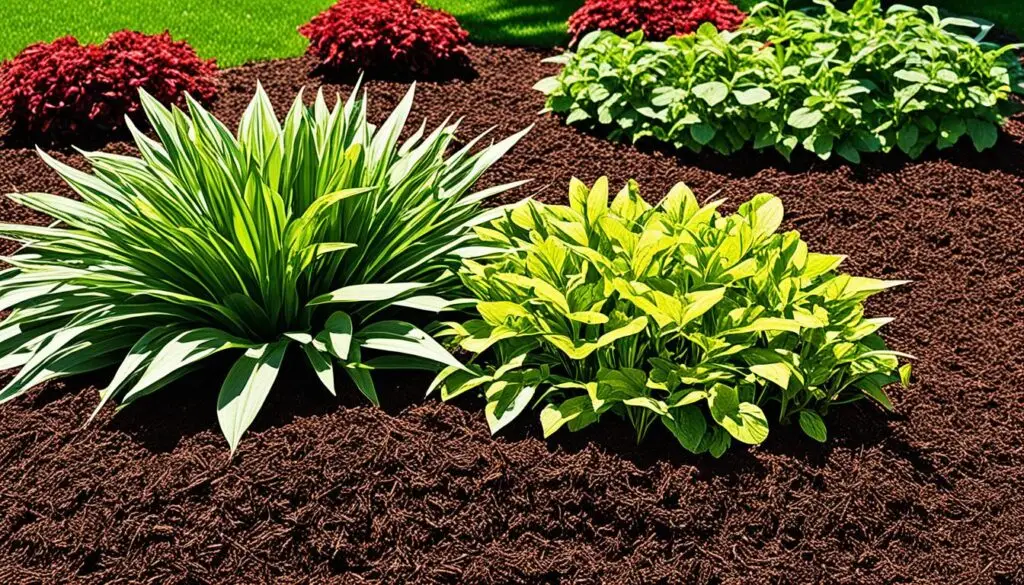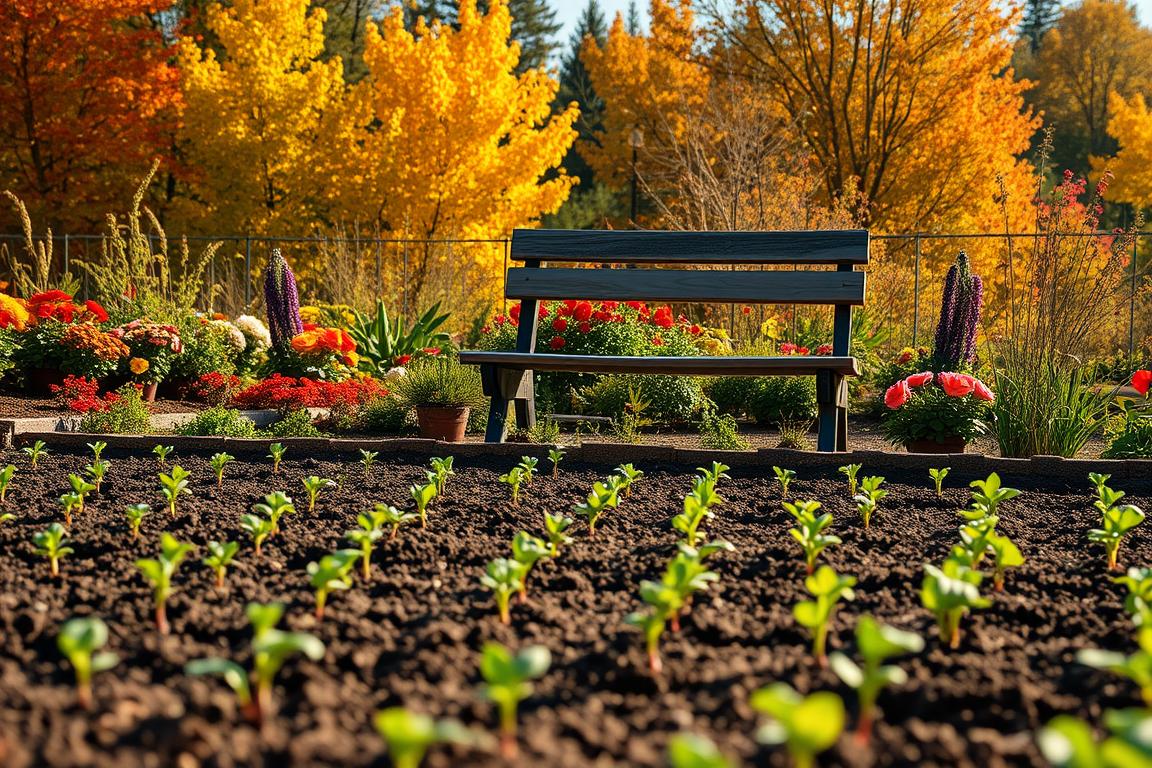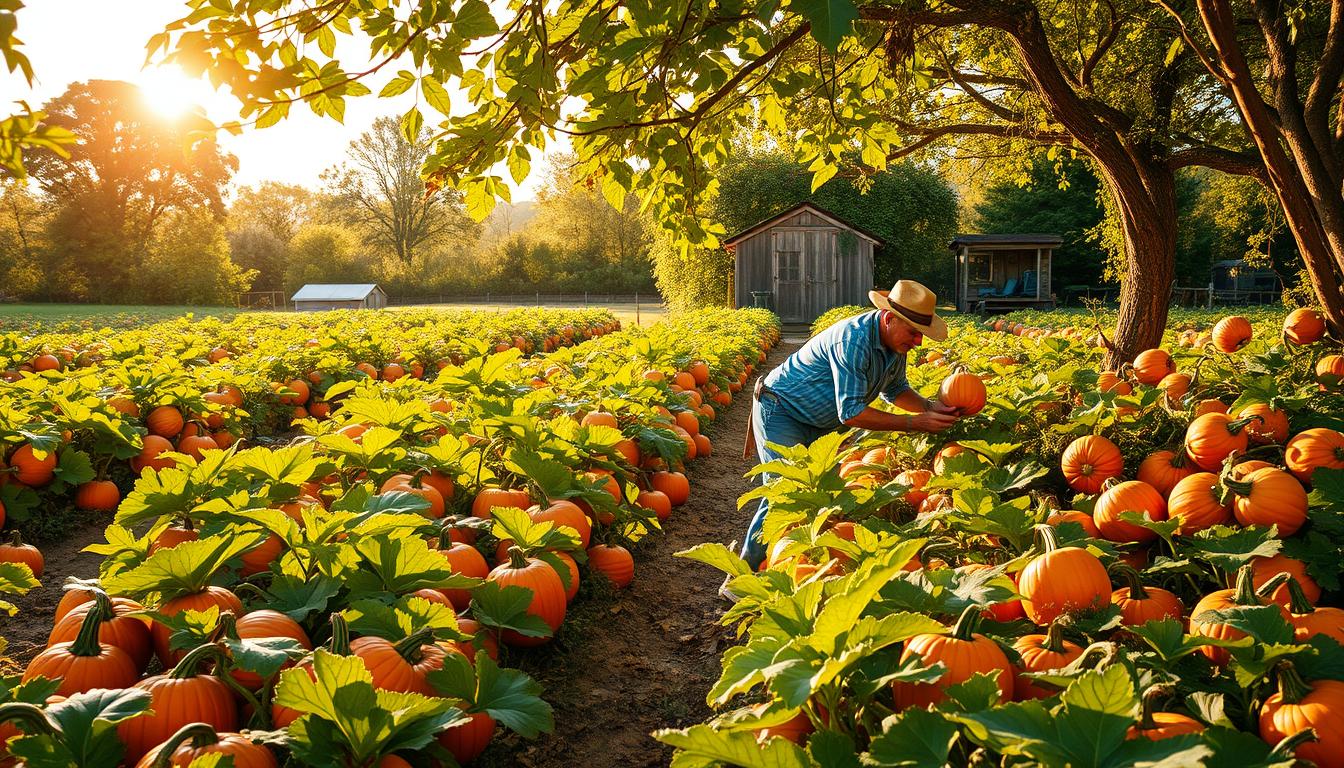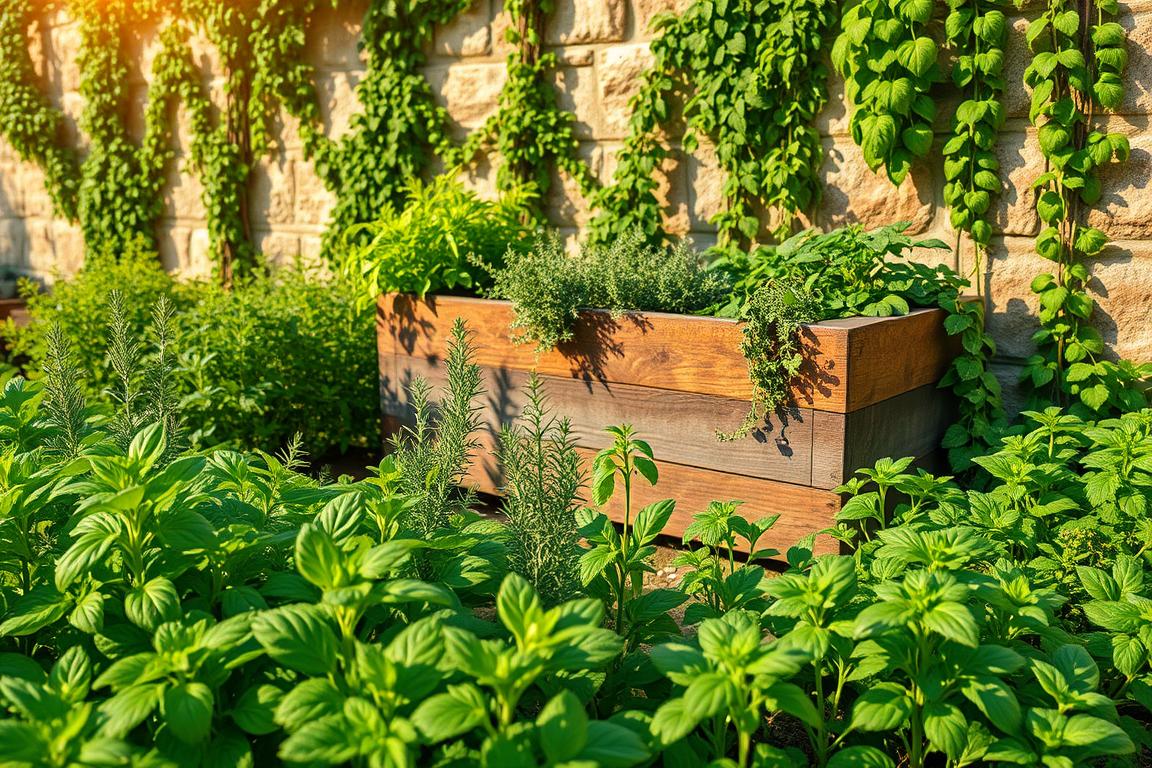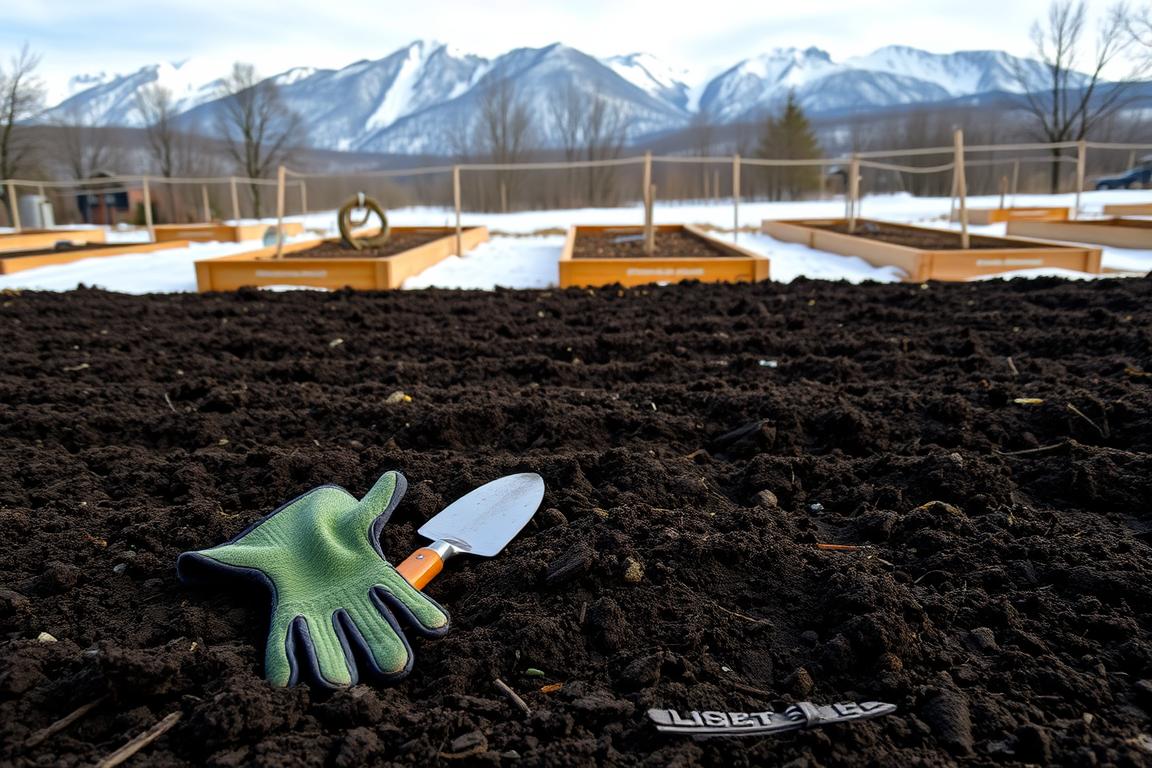A beautiful garden is full of bright colors and lush, healthy plants. It takes more than just watering and pruning to keep a garden in top shape. Mulch is a key player in garden care, often missed but critical. It’s a layer of material, organic or not, that covers the soil around your plants.
Mulch offers many benefits, making it vital for any garden. It keeps soil moisture, stops weeds, and makes the soil better. It also keeps the soil temperature steady, stops erosion, and makes your garden look better.
Key Takeaways
- Mulch is a protective layer of organic or inorganic material that offers numerous benefits for the garden.
- Mulch helps to conserve soil moisture, suppress weeds, enrich the soil, regulate soil temperature, and prevent erosion.
- Mulch enhances the aesthetic appeal of the garden by adding a neat and tidy appearance.
- Incorporating mulch into your garden routine is a simple yet impactful way to ensure the long-term success and vitality of your green space.
- Mulch is an essential component of any successful and healthy garden.
What is Mulch and Why is it Important?
Mulch is a layer of stuff like wood chips or leaves spread over garden soil. It’s like a protective blanket. It keeps the soil safe. Mulch can be made from many things, like wood chips, straws, leaves, or plastic sheeting. Each type of mulch plays a key role in your garden.
Defining Mulch and Its Purpose
Mulch is not just for looks. It protects the soil from weather and helps plants grow. By using mulch, your garden can be healthy and flourishing.
Mulch as a Protective Layer for Soil
Mulch is great for the earth underneath. It keeps the soil’s temperature steady and holds in moisture. It also stops weeds from growing and keeps the soil from washing away. This makes your plants’ environment perfect for growing.
Types of Mulch Materials
You can choose from a lot of mulch types. Organic mulch comes from things like wood chips, bark, and leaves. Or try inorganic mulch, which includes gravel and plastic. Each type has its own benefits. Choose the one that works best for your garden and that looks how you want it to.
The Role of Mulch in Moisture Retention
Mulch is vital for keeping the soil moist. It works like a natural barrier, cutting the amount of water lost to evaporation. This is key in hot, dry weather or places that don’t get much rain. By holding in moisture, mulch makes sure the soil stays damp. This is great for plants because it means less watering is needed, saving both time and water.
How Mulch Helps Conserve Soil Moisture
A layer of mulch slows down water evaporation from the soil. It keeps the ground moist, which helps plants grow strong. Mulch acts like a blanket, keeping soil cool and wet, even when it’s hot and dry outside.
Reducing Water Evaporation and Loss
Mulch stops water from evaporating quickly in the sun and wind. In dry, hot places, it’s a real lifesaver for the soil. With mulch, the soil doesn’t dry out fast. This means you don’t have to water as often, helping to save water.
Minimizing the Need for Frequent Watering
Mulch reduces the times you need to water your plants. It keeps the soil moist, so plants can drink when they need to. This helps gardeners by cutting down on watering chores. Plus, it’s great for the garden’s health in the long run.
Weed Suppression and Soil Enrichment
Mulch is great for keeping weeds at bay in your garden. It acts as a barrier against sunlight, which stops weed seeds from growing. This prevents weed seed germination and keeps the soil clear. Pulling out any weeds that do appear is easier since they’re not deep in the soil.
Mulch as an Effective Weed Barrier
By covering the soil, mulch stops sunlight from getting to weed seeds. This serves as a strong defense, preventing weed germination. It’s a simple yet powerful way to keep your garden weed-free.
Preventing Weed Seed Germination
Mulch doesn’t let weed seeds get the sunlight they need to grow. So, it inhibits weed seed germination. This means there are fewer weeds taking resources from your plants.
Decomposition and Nutrient Release
Organic mulches break down over time, enriching the soil with vital nutrients. This adds nitrogen, phosphorus, and potassium to the soil. Plants absorb these nutrients, which helps them grow strong and healthy.
Improving Soil Structure and Fertility
As mulch decomposes, it improves soil’s structure and fertility. Adding organic matter to the soil boosts its health. This creates a better home for your plants, enhancing their growth and strength.
“The Role of Mulch in Maintaining a Healthy Garden”
Mulch is key in keeping soil temperatures steady. In summer, it acts like a blanket, making sure the soil doesn’t get too hot. This helps plants avoid heat stress. In winter, it keeps the soil warm to protect plant roots from freezing temperatures. Sensitive plants, like perennials and new seedlings, benefit a lot from this.
Temperature Regulation for Plant Roots
Mulch keeps the soil at an even temperature, which is great for plant roots. It acts as a shield against extreme heat and cold. This makes for a perfect growing environment. It’s a vital part of keeping your garden healthy.
Protecting Roots from Heat and Cold Stress
When it’s super hot, mulch stops the soil from overheating. This prevents harm to the roots. In winter, it keeps the soil warm, protecting roots from frost. The mulch is like a protective layer, keeping your garden strong all year.
Erosion Prevention and Aesthetic Benefits
Mulch is great for stopping erosion. Heavy rain and wind can wash soil away, harming your garden. Mulch acts like a shield, cutting the impact of rain and wind on soil. It slows water down, letting it soak in over time. With less erosion, the garden’s soil stays healthy. This keeps plants strong by holding in nutrients and providing a stable place to grow.
Mulch isn’t just useful, it looks nice too. With many colors and feels, you can pick what suits your style. It makes your garden look orderly, highlighting your plants against a clean background. Mulch also helps to define planting areas, pathways, and borders, making your design stand out.
Conclusion
Mulch is like the quiet hero of gardening. It helps with so many things, including keeping moisture in, stopping weeds, and making the soil better. It also keeps the temperature right, stops the soil from washing away, and looks good. With mulch, gardens can be healthy, pretty, and good for the Earth.
Adding mulch to your garden is easy and has big benefits. It helps your garden stay healthy in the long run. Gardeners find that their plants are happier, look brighter, and grow better when they use mulch.
In the end, mulch is very important for anyone who loves to garden. It does a lot of great things for your garden. By using mulch, gardeners can enjoy a beautiful and productive outdoor space that is also good for the environment.
FAQ
What is mulch and why is it important for a garden?
Mulch is a layer over soil made of organic or inorganic materials like wood chips, leaves, or gravel. It shields the soil and helps plant growth and soil health. Mulch keeps the soil moist, stops weeds, feeds the soil, and controls temperature.
What are the common types of mulch materials?
Organic mulch includes wood chips, bark, leaves, straw, and grass clippings. Inorganic options are gravel, stone, and plastic sheeting.
How does mulch help conserve soil moisture?
Mulch stops moisture from evaporating by creating a barrier. It also protects against water loss from wind and sun. This keeps the soil moist, reducing watering needs and helping plants grow strong.
How does mulch suppress weeds in the garden?
It creates a shield that stops sunlight from reaching weed seeds, thus stopping their growth. Weeds that do grow are easy to remove because they’re not firmly rooted.
How does mulch enrich the soil?
Organic mulches like wood chips decompose, releasing important nutrients for plants to absorb. They also add organic material to the soil, making it better for plants and increasing microbial activity.
How does mulch help regulate soil temperature?
Mulch insulates the soil, keeping it cooler in summer and warmer in winter. This protects plants from extreme temperatures. It’s especially good for sensitive plants.
How does mulch prevent soil erosion?
As a protective layer, mulch reduces the damage from rain and wind. It slows down water, letting it soak into the soil. This stops soil and nutrient loss caused by erosion.
How does mulch enhance the aesthetic appeal of a garden?
With many colors and textures, mulch can match any garden and gardener’s style. It makes the garden look neat and attractive. Mulch also helps mark out different areas like plant beds and paths.


